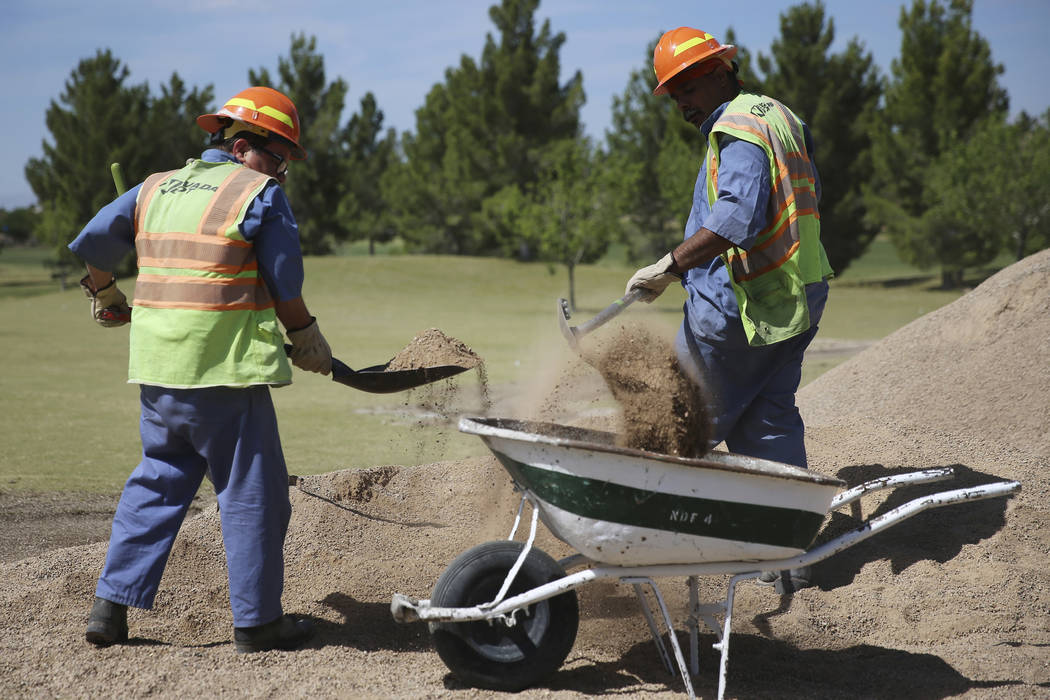North Las Vegas golf course using GPS to tear out turf

Aliante Golf Club is the latest Las Vegas Valley course to tear out turf and cut its water use with the help of some space-age technology.
About six months ago, staff members from the Southern Nevada Water Authority issued GPS tracking units to golfers at the city-owned course in North Las Vegas to help identify areas that don’t see any cart traffic or play.
“They were here for several days. They did a lot of tracking, hundreds of rounds,” said golf course general manager Bill Rowden. “It just showed areas that … golf carts were really not going to.”
That data is now being used to guide the first big turf conversion project at the 18-hole course.
Almost 129,000 square feet of grass is being ripped out and replaced with fine-grain rock and desert landscaping, cutting the property’s water use by more than 7 million gallons a year.
The course is also eligible for more than $208,000 in rebates from the authority’s Water Smart Landscapes program, which pays residents and businesses to replace their grass with desert plants.
North Las Vegas spokeswoman Sandy Lopez said the rebate money would be used for golf course maintenance and operations.
More grass will go
Rowden said the work should be finished within two weeks or so, and plans are already being made for the next conversion project.
“To keep all this green year round when you really don’t have to? We’re really glad that we’ve got the ability to do this to save for the community,” he said.
Aliante is the latest of several courses to undergo the water authority’s GPS treatment.
“In some cases we’ve used it on golf courses where they’ve already done those (conversion) projects to kind of validate (whether they made) good choices,” said Doug Bennett, conservation manager for the authority. “The golf industry has been very responsible and responsive.”
Since the authority launched its turf-rebate program 20 years ago, golf courses valleywide have eliminated more than 900 acres of grass, saving more than 2 billion gallons of water annually.
Most of Aliante’s targeted turf is at the back of the driving range and around the tee boxes on the ninth and 18th holes.
“It’s about a 350-yard driving range. Not too many people hit it that far, so we’ve got some easy turf to remove out here,” Rowden said. “It doesn’t really affect play. It doesn’t affect the aesthetics. The golfer really doesn’t see a change.”
The next round of turf removal, slated for next year, will be more delicate.
Rowden said they have begun to identify small strips and isolated pockets of grass that could be eliminated. The GPS data is helping with that process.
‘That adds up’
He’s hoping to cut out another 100,000 square feet of turf if he can. “Two thousand square feet here and there, that adds up,” Rowden said.
When North Las Vegas opened Aliante Golf Club in 2004, the Colorado River was already four years into a record drought that continues to this day.
The Las Vegas Valley relies on the river for about 90 percent of its water supply, so as the drought deepened the authority adopted a slate of restrictions aimed at cutting consumption, including strict water budgets for golf courses.
Cutting water use is especially important for the Aliante operation, Rowden said, because it does not have access to groundwater wells or reclaimed sewer water like other valley courses do. Aliante has to irrigate with treated drinking water, Rowden said. “It’s a little more pricey.”
The ongoing conversion project at the course certainly didn’t disrupt golfer Pat McGonagle’s routine on Thursday.
From his spot on the practice tee, the Aliante regular could see the workers shoveling decomposed granite in the distance, but he said the men in hard hats were safely outside the range of his driver.
McGonagle said Elite Golf Management, Rowden’s employer, has made a lot of improvements since the city hired it to run the course in 2017. Taking out some turf is the right thing to do, he said, and he trusts Elite to do it without ruining the place.
“When you live in Las Vegas, you have to conserve,” McGonagle said.
Contact Henry Brean at hbrean@reviewjournal.com or 702-383-0350. Follow @RefriedBrean on Twitter.